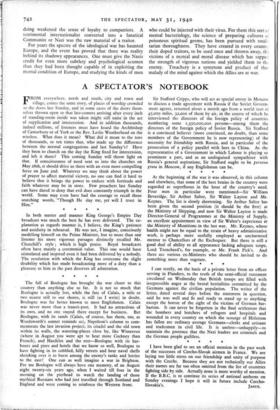The fall of Boulogne has brought the war closer to
this country than anything else so far. It is not so much that Boulogne is actually lost, while the fate of Calais, a mile or two nearer still to our shores, is still (as I write) in doubt. Boulogne was far better known to most Englishmen. Calais was never more than a transit-post. It had no attractions of its own, and no one stayed there except for business. But Boulogne, with its sands (Calais, of course, has them, too, as Wordsworth's sonnet reminds us), Napoleon's column to com- memorate the last invasion project, its citadel and the old town within its walls, the watering-places close by, like Wimereux (where in August you were apt to hear more Cockney than French), and Hardelot and the rest—Boulogne with its har- bours and piers and hotels that we know so well, Boulogne to have fighting in its cobbled, hilly streets and hear naval shells shrieking over it to burst among the enemy's tanks and lorries to the east! One can as well imagine a war in Brighton. For me Boulogne will always have one memory, of an August night twenty-six years ago, when I waited till four in the morning on the pierhead to watch the landing of those mythical Russians who had just travelled through Scotland and England and were coming to reinforce the Western front.






























 Previous page
Previous page